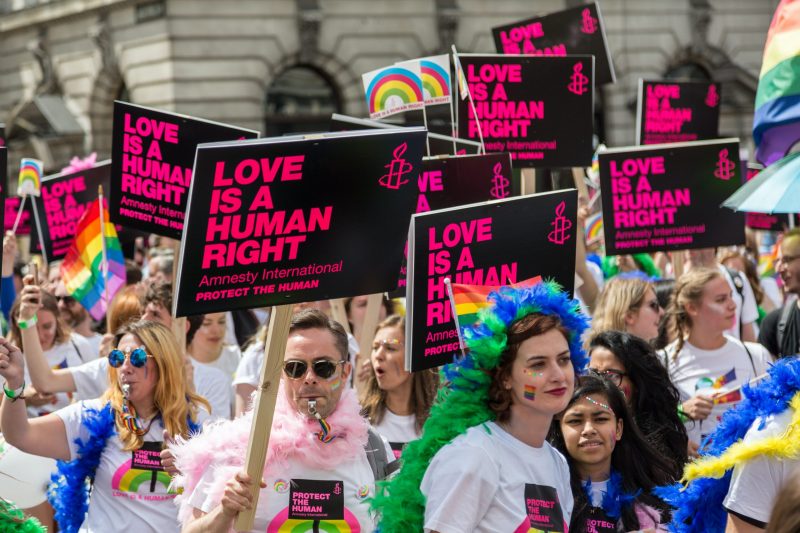In light of LGBTQ+ History Month, I’m taking us back to 1988 when the Conservative Government introduced Section 28 (or Clause 28), a law that prohibited the ‘promotion of homosexuality’ in local authorities.
The homophobic law stated that ‘local authorities shall not promote the teaching in any maintained school of the acceptability of homosexuality’ in an effort to avoid the ‘indoctrination’ of young people.
To find out more about how Section 28 affected the lives of LGBTQ+ people with a career in education, I interviewed a bisexual individual (who would like to remain anonymous) and asked them some questions about their experiences at the time.
You worked in education when Section 28 was passed. What was your role?
In 1988 I was a teacher in a Special School for boys in Leicester and in 1990 moved to a different teaching post in Warwickshire in a support service which had a Pupil Referral Unit, but mainly supported students in mainstream and advised teachers.
Can you remember when you heard about the clause and what were your initial feelings?
I heard about Clause 28 before it became law, partly as I was quite active in the NUT (National Union of Teachers) and socialist/feminist political activities. My feelings were a mixture of anger, worry, and concern.
At this time of your life were you open about your sexuality?
In the early ‘80’s I had worked at a large inner-city primary school in Leicester, many of the staff were socialists and politically active, and were friends. Some knew about my sexuality.
When I was living and working in Leicester I was cautious about being ‘seen’ with my girlfriend and looking around to see who was there when going into gay or women’s bars/clubs. Generally, there was not the openness (e.g. hand-holding in public) that there is now.
Were there times that you wanted to support children at the school, but the clause prevented you from doing so?
My main concern when working in the Special School, and later in Warwickshire, was that I was not very effective in dealing with homophobic bullying and ‘you’re gay’ was a very common insult, but often it could become a lot more unpleasant and harmful. I did try to be supportive to students who were ‘struggling’ with their sexuality but as all the students I was then working with had Social, Emotional, and Behavioural Difficulties it was a complex situation. The difficulties in these situations I could accept, but Clause 28 I think made me more cautious.
How did Section 28 change your working environment?
There were times I remember, mainly when I was visiting different schools as part of my support job, that there would be ‘anti gay’ jokes made in the staffroom and I did not challenge these enough. When two other women came out as gay in the Support Service there was a better coordinated approach to homophobic bullying. Again, several of the staff in this setting were politically active and socialist.
In 1996 I started having a relationship with a male colleague (who I’m now married to). I believe that once I was in this relationship I was a lot more open and strong in dealing with homophobia in educational settings I worked in… feel a bit sad that being seen as ‘straight’ at work made me more effective.
Did you know of other LGBTQ+ members of staff in your school who were also affected by the clause?
I moved to work in the Special school in 1986, obviously, it took a while to develop friendships and trust. At that school one man was gay and one woman was a lesbian (that I knew of), neither of them teachers but support staff. I believe all of us were cautious. Some staff were aware of our sexuality but many weren’t and particularly after Clause 28 I was not willing to broadcast this information!
How did you view the Government after Section 28 was passed?
I think the Government had developed Clause 28 partly because of the strength of the LGB (as it was then!) movement which supported many other political movements, particularly the miner’s strike and Greenham Common, but also as a reaction against AIDS and HIV.
Did you partake in any protests/demonstrations and what was the atmosphere like?
I went to an anti Clause 28 demo in London, and remember the police seemed quite hostile. I also remember (but wasn’t involved in these actions) that a group of lesbian activists abseiled into the House of Lords and also ‘stormed’ the BBC studios.
Lastly, do you think that the Government today has improved compared to the 1980s in terms of LGBTQ+ acceptance?
I think the Government’s attitude has improved greatly, and so it should, but there are obviously further changes necessary. Back in the ‘90s, it felt like the Government thought people who worked with young people had no right to be gay. I did know that Clause 28 was mainly directed at Local Authorities, but I think I was like many others- I was concerned and felt constrained, inhibited and restricted.
The 1980s were already a difficult time for LGBTQ+ people due to the AIDS crisis and Section 28 further perpetuated homophobia in the UK. While the law seems shocking today, it was only repealed in England in 2003. Thankfully, a lot of progress has been made since Section 28 was passed, but its legacy still has heavy implications, especially for those who were affected by it.
This month particularly, it is vital to look back in history and remember the challenges that LGBTQ+ communities faced, while continuing forward to create more open-minded, equal and safe environments for those who are still facing discrimination.
By Helen Barber
Feature image: Unsplash


